Contract Law: An Examination of the Eva vs. Smyslovski Case Study
VerifiedAdded on 2023/01/12
|7
|2651
|89
Case Study
AI Summary
This case study analyzes a contract law dispute between Eva and Smyslovski concerning the purchase of an ornament. The assignment explores key contract law principles, including offer and acceptance, the concept of consideration, and the implications of misrepresentation and mistake. The analysis examines whether the contract is valid, void, or voidable, considering issues such as unilateral mistake and the role of implied terms. The student applies legal precedents, such as Carlill v Carbolic Smoke Ball Co and Derry v Peek, to the facts, evaluating the potential for misrepresentation and the impact of Smyslovski's lack of knowledge about the ornament's authenticity. The conclusion determines the nature of the contract and the available remedies, emphasizing the concept of a voidable contract due to unilateral mistake and innocent misrepresentation. The document is contributed by a student to be published on the website Desklib. Desklib is a platform which provides all the necessary AI based study tools for students.
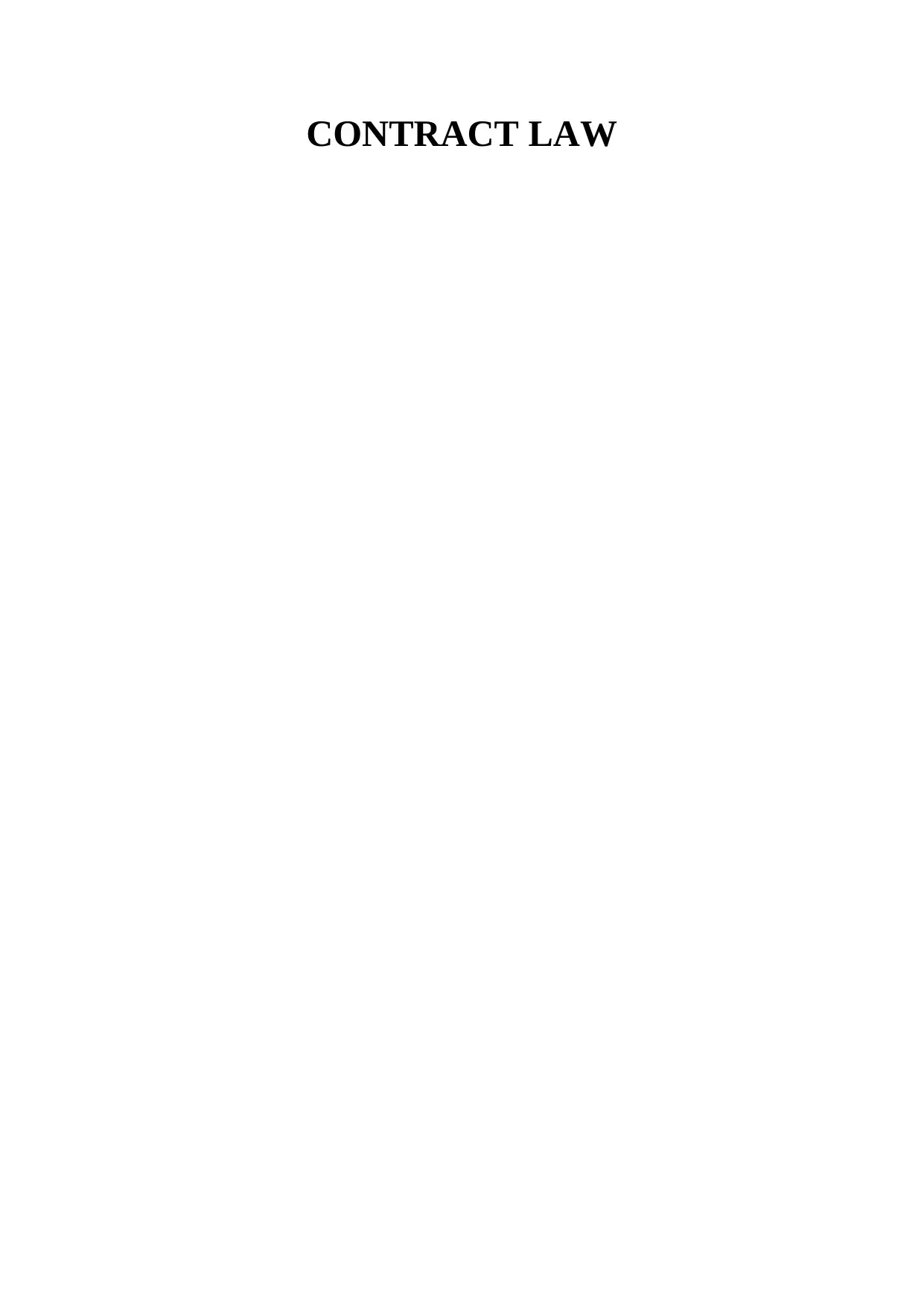
CONTRACT LAW
Paraphrase This Document
Need a fresh take? Get an instant paraphrase of this document with our AI Paraphraser
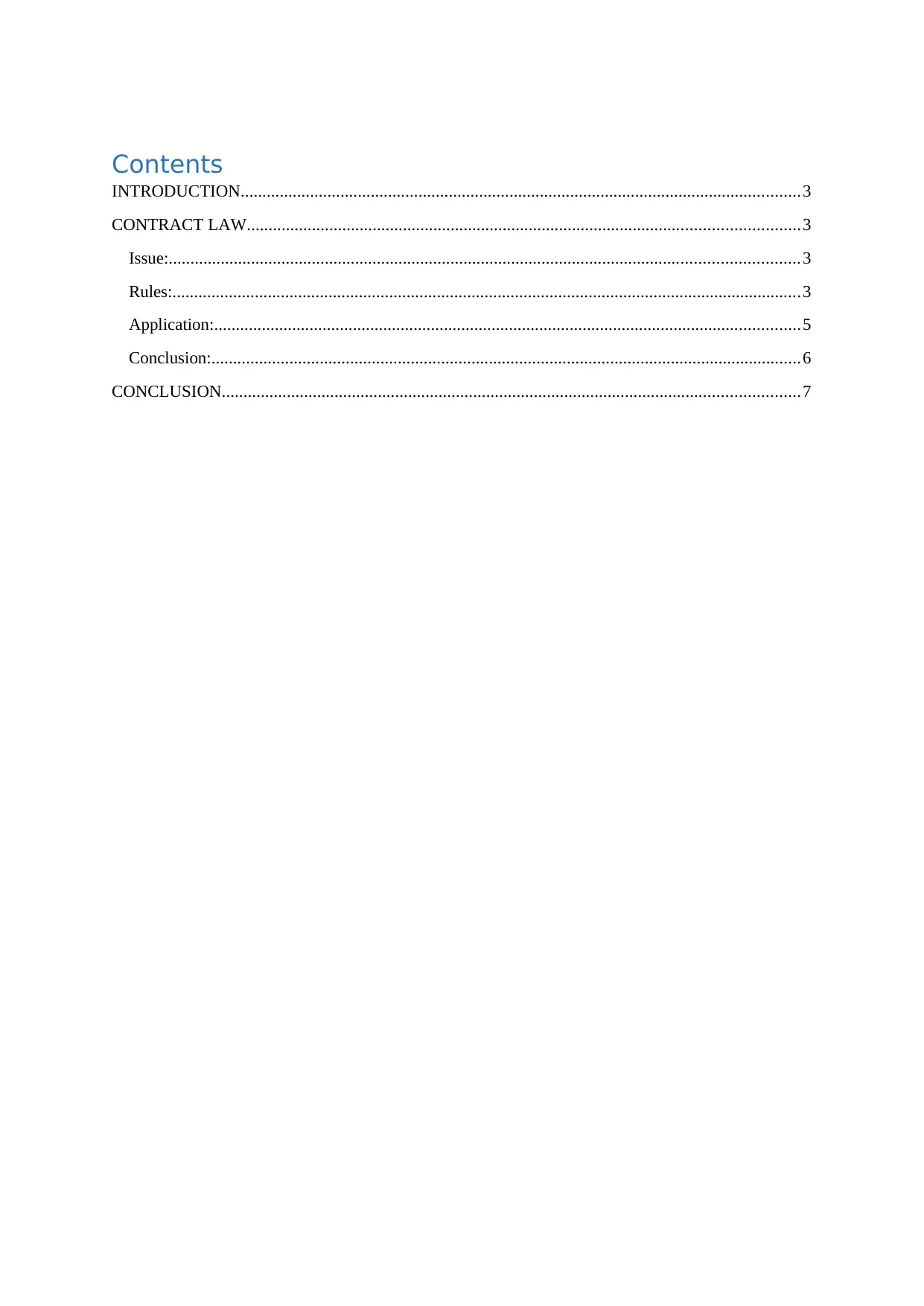
Contents
INTRODUCTION.................................................................................................................................3
CONTRACT LAW...............................................................................................................................3
Issue:.................................................................................................................................................3
Rules:.................................................................................................................................................3
Application:.......................................................................................................................................5
Conclusion:........................................................................................................................................6
CONCLUSION.....................................................................................................................................7
INTRODUCTION.................................................................................................................................3
CONTRACT LAW...............................................................................................................................3
Issue:.................................................................................................................................................3
Rules:.................................................................................................................................................3
Application:.......................................................................................................................................5
Conclusion:........................................................................................................................................6
CONCLUSION.....................................................................................................................................7
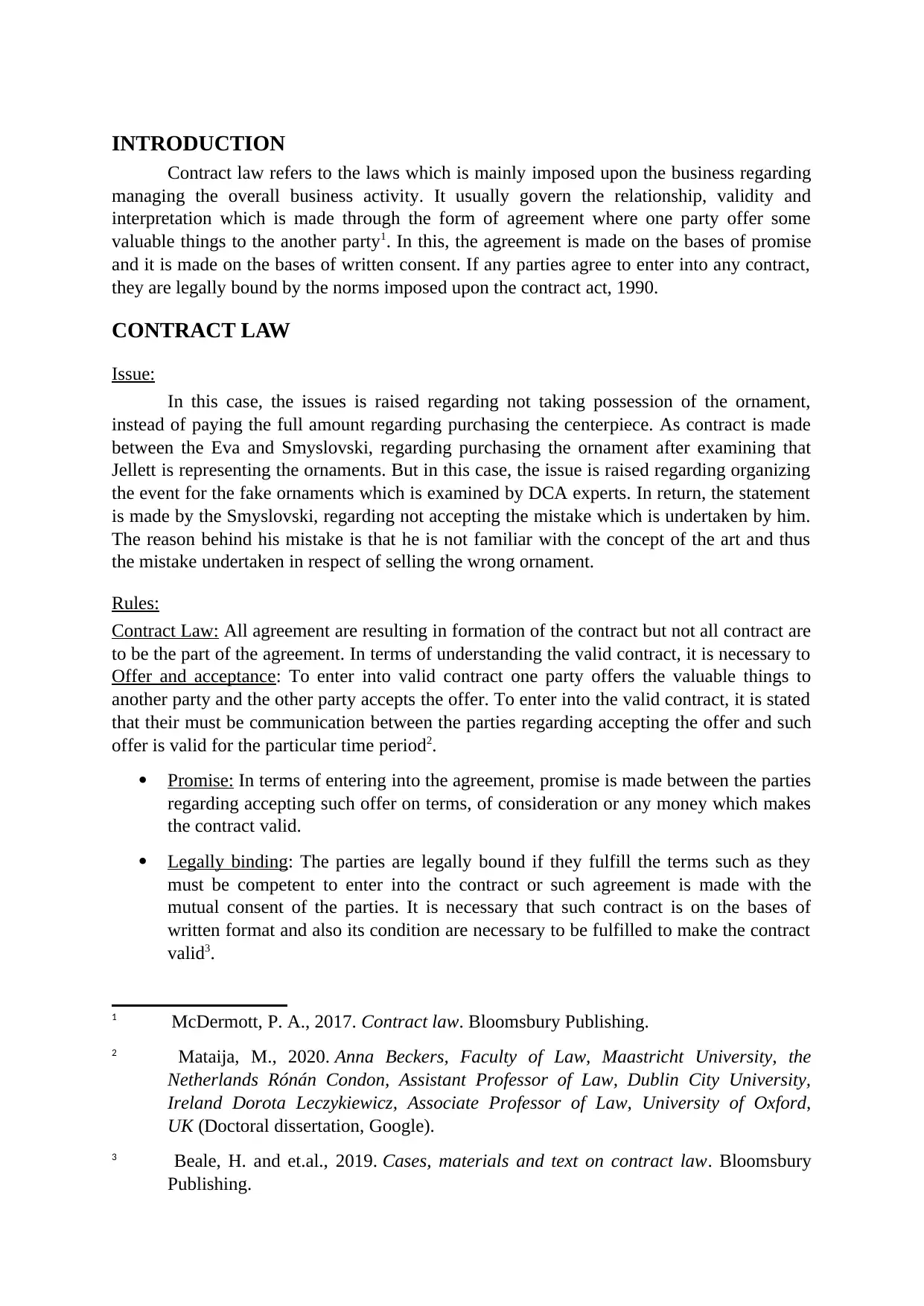
INTRODUCTION
Contract law refers to the laws which is mainly imposed upon the business regarding
managing the overall business activity. It usually govern the relationship, validity and
interpretation which is made through the form of agreement where one party offer some
valuable things to the another party1. In this, the agreement is made on the bases of promise
and it is made on the bases of written consent. If any parties agree to enter into any contract,
they are legally bound by the norms imposed upon the contract act, 1990.
CONTRACT LAW
Issue:
In this case, the issues is raised regarding not taking possession of the ornament,
instead of paying the full amount regarding purchasing the centerpiece. As contract is made
between the Eva and Smyslovski, regarding purchasing the ornament after examining that
Jellett is representing the ornaments. But in this case, the issue is raised regarding organizing
the event for the fake ornaments which is examined by DCA experts. In return, the statement
is made by the Smyslovski, regarding not accepting the mistake which is undertaken by him.
The reason behind his mistake is that he is not familiar with the concept of the art and thus
the mistake undertaken in respect of selling the wrong ornament.
Rules:
Contract Law: All agreement are resulting in formation of the contract but not all contract are
to be the part of the agreement. In terms of understanding the valid contract, it is necessary to
Offer and acceptance: To enter into valid contract one party offers the valuable things to
another party and the other party accepts the offer. To enter into the valid contract, it is stated
that their must be communication between the parties regarding accepting the offer and such
offer is valid for the particular time period2.
Promise: In terms of entering into the agreement, promise is made between the parties
regarding accepting such offer on terms, of consideration or any money which makes
the contract valid.
Legally binding: The parties are legally bound if they fulfill the terms such as they
must be competent to enter into the contract or such agreement is made with the
mutual consent of the parties. It is necessary that such contract is on the bases of
written format and also its condition are necessary to be fulfilled to make the contract
valid3.
1 McDermott, P. A., 2017. Contract law. Bloomsbury Publishing.
2 Mataija, M., 2020. Anna Beckers, Faculty of Law, Maastricht University, the
Netherlands Rónán Condon, Assistant Professor of Law, Dublin City University,
Ireland Dorota Leczykiewicz, Associate Professor of Law, University of Oxford,
UK (Doctoral dissertation, Google).
3 Beale, H. and et.al., 2019. Cases, materials and text on contract law. Bloomsbury
Publishing.
Contract law refers to the laws which is mainly imposed upon the business regarding
managing the overall business activity. It usually govern the relationship, validity and
interpretation which is made through the form of agreement where one party offer some
valuable things to the another party1. In this, the agreement is made on the bases of promise
and it is made on the bases of written consent. If any parties agree to enter into any contract,
they are legally bound by the norms imposed upon the contract act, 1990.
CONTRACT LAW
Issue:
In this case, the issues is raised regarding not taking possession of the ornament,
instead of paying the full amount regarding purchasing the centerpiece. As contract is made
between the Eva and Smyslovski, regarding purchasing the ornament after examining that
Jellett is representing the ornaments. But in this case, the issue is raised regarding organizing
the event for the fake ornaments which is examined by DCA experts. In return, the statement
is made by the Smyslovski, regarding not accepting the mistake which is undertaken by him.
The reason behind his mistake is that he is not familiar with the concept of the art and thus
the mistake undertaken in respect of selling the wrong ornament.
Rules:
Contract Law: All agreement are resulting in formation of the contract but not all contract are
to be the part of the agreement. In terms of understanding the valid contract, it is necessary to
Offer and acceptance: To enter into valid contract one party offers the valuable things to
another party and the other party accepts the offer. To enter into the valid contract, it is stated
that their must be communication between the parties regarding accepting the offer and such
offer is valid for the particular time period2.
Promise: In terms of entering into the agreement, promise is made between the parties
regarding accepting such offer on terms, of consideration or any money which makes
the contract valid.
Legally binding: The parties are legally bound if they fulfill the terms such as they
must be competent to enter into the contract or such agreement is made with the
mutual consent of the parties. It is necessary that such contract is on the bases of
written format and also its condition are necessary to be fulfilled to make the contract
valid3.
1 McDermott, P. A., 2017. Contract law. Bloomsbury Publishing.
2 Mataija, M., 2020. Anna Beckers, Faculty of Law, Maastricht University, the
Netherlands Rónán Condon, Assistant Professor of Law, Dublin City University,
Ireland Dorota Leczykiewicz, Associate Professor of Law, University of Oxford,
UK (Doctoral dissertation, Google).
3 Beale, H. and et.al., 2019. Cases, materials and text on contract law. Bloomsbury
Publishing.
⊘ This is a preview!⊘
Do you want full access?
Subscribe today to unlock all pages.

Trusted by 1+ million students worldwide
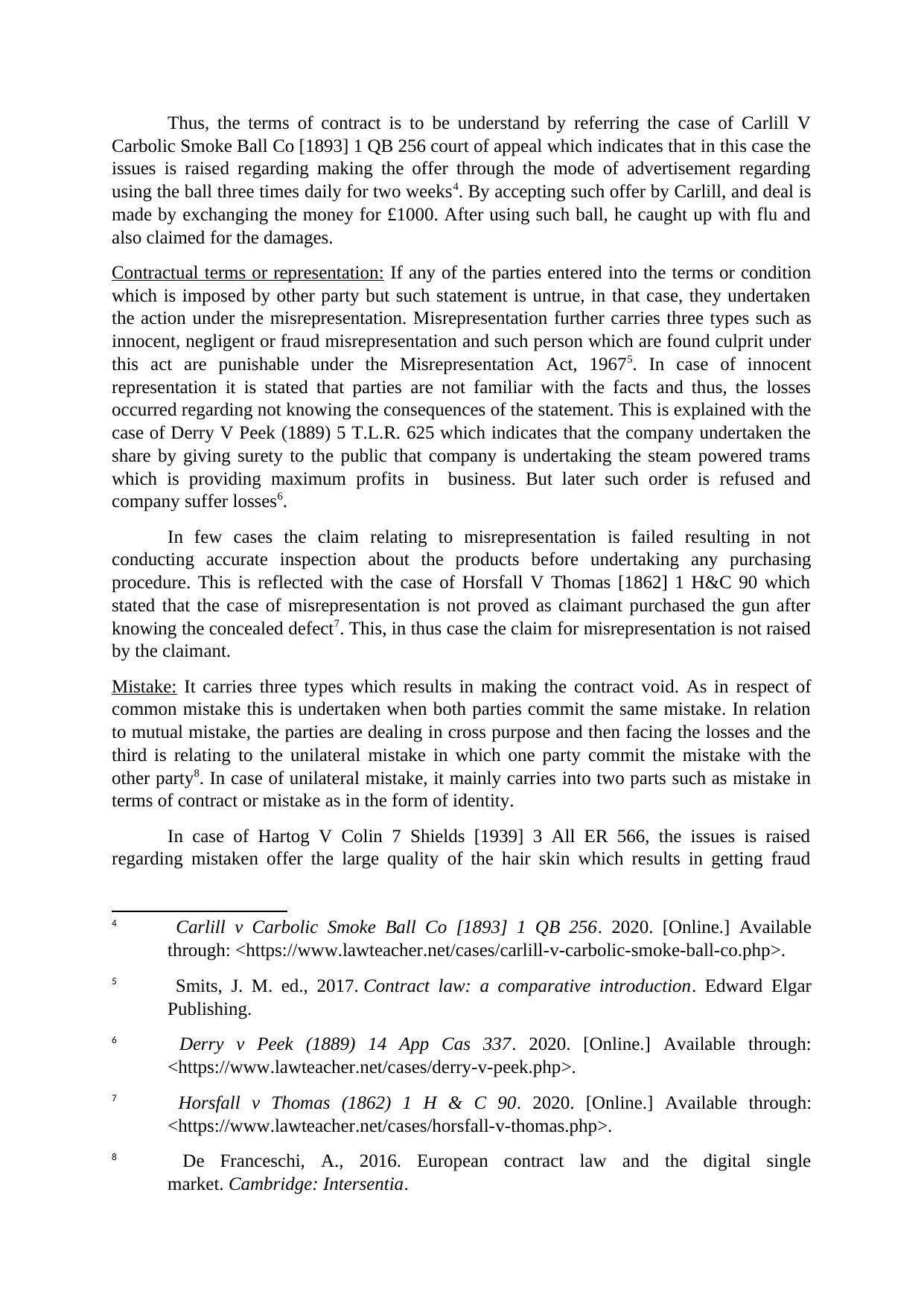
Thus, the terms of contract is to be understand by referring the case of Carlill V
Carbolic Smoke Ball Co [1893] 1 QB 256 court of appeal which indicates that in this case the
issues is raised regarding making the offer through the mode of advertisement regarding
using the ball three times daily for two weeks4. By accepting such offer by Carlill, and deal is
made by exchanging the money for £1000. After using such ball, he caught up with flu and
also claimed for the damages.
Contractual terms or representation: If any of the parties entered into the terms or condition
which is imposed by other party but such statement is untrue, in that case, they undertaken
the action under the misrepresentation. Misrepresentation further carries three types such as
innocent, negligent or fraud misrepresentation and such person which are found culprit under
this act are punishable under the Misrepresentation Act, 19675. In case of innocent
representation it is stated that parties are not familiar with the facts and thus, the losses
occurred regarding not knowing the consequences of the statement. This is explained with the
case of Derry V Peek (1889) 5 T.L.R. 625 which indicates that the company undertaken the
share by giving surety to the public that company is undertaking the steam powered trams
which is providing maximum profits in business. But later such order is refused and
company suffer losses6.
In few cases the claim relating to misrepresentation is failed resulting in not
conducting accurate inspection about the products before undertaking any purchasing
procedure. This is reflected with the case of Horsfall V Thomas [1862] 1 H&C 90 which
stated that the case of misrepresentation is not proved as claimant purchased the gun after
knowing the concealed defect7. This, in thus case the claim for misrepresentation is not raised
by the claimant.
Mistake: It carries three types which results in making the contract void. As in respect of
common mistake this is undertaken when both parties commit the same mistake. In relation
to mutual mistake, the parties are dealing in cross purpose and then facing the losses and the
third is relating to the unilateral mistake in which one party commit the mistake with the
other party8. In case of unilateral mistake, it mainly carries into two parts such as mistake in
terms of contract or mistake as in the form of identity.
In case of Hartog V Colin 7 Shields [1939] 3 All ER 566, the issues is raised
regarding mistaken offer the large quality of the hair skin which results in getting fraud
4 Carlill v Carbolic Smoke Ball Co [1893] 1 QB 256. 2020. [Online.] Available
through: <https://www.lawteacher.net/cases/carlill-v-carbolic-smoke-ball-co.php>.
5 Smits, J. M. ed., 2017. Contract law: a comparative introduction. Edward Elgar
Publishing.
6 Derry v Peek (1889) 14 App Cas 337. 2020. [Online.] Available through:
<https://www.lawteacher.net/cases/derry-v-peek.php>.
7 Horsfall v Thomas (1862) 1 H & C 90. 2020. [Online.] Available through:
<https://www.lawteacher.net/cases/horsfall-v-thomas.php>.
8 De Franceschi, A., 2016. European contract law and the digital single
market. Cambridge: Intersentia.
Carbolic Smoke Ball Co [1893] 1 QB 256 court of appeal which indicates that in this case the
issues is raised regarding making the offer through the mode of advertisement regarding
using the ball three times daily for two weeks4. By accepting such offer by Carlill, and deal is
made by exchanging the money for £1000. After using such ball, he caught up with flu and
also claimed for the damages.
Contractual terms or representation: If any of the parties entered into the terms or condition
which is imposed by other party but such statement is untrue, in that case, they undertaken
the action under the misrepresentation. Misrepresentation further carries three types such as
innocent, negligent or fraud misrepresentation and such person which are found culprit under
this act are punishable under the Misrepresentation Act, 19675. In case of innocent
representation it is stated that parties are not familiar with the facts and thus, the losses
occurred regarding not knowing the consequences of the statement. This is explained with the
case of Derry V Peek (1889) 5 T.L.R. 625 which indicates that the company undertaken the
share by giving surety to the public that company is undertaking the steam powered trams
which is providing maximum profits in business. But later such order is refused and
company suffer losses6.
In few cases the claim relating to misrepresentation is failed resulting in not
conducting accurate inspection about the products before undertaking any purchasing
procedure. This is reflected with the case of Horsfall V Thomas [1862] 1 H&C 90 which
stated that the case of misrepresentation is not proved as claimant purchased the gun after
knowing the concealed defect7. This, in thus case the claim for misrepresentation is not raised
by the claimant.
Mistake: It carries three types which results in making the contract void. As in respect of
common mistake this is undertaken when both parties commit the same mistake. In relation
to mutual mistake, the parties are dealing in cross purpose and then facing the losses and the
third is relating to the unilateral mistake in which one party commit the mistake with the
other party8. In case of unilateral mistake, it mainly carries into two parts such as mistake in
terms of contract or mistake as in the form of identity.
In case of Hartog V Colin 7 Shields [1939] 3 All ER 566, the issues is raised
regarding mistaken offer the large quality of the hair skin which results in getting fraud
4 Carlill v Carbolic Smoke Ball Co [1893] 1 QB 256. 2020. [Online.] Available
through: <https://www.lawteacher.net/cases/carlill-v-carbolic-smoke-ball-co.php>.
5 Smits, J. M. ed., 2017. Contract law: a comparative introduction. Edward Elgar
Publishing.
6 Derry v Peek (1889) 14 App Cas 337. 2020. [Online.] Available through:
<https://www.lawteacher.net/cases/derry-v-peek.php>.
7 Horsfall v Thomas (1862) 1 H & C 90. 2020. [Online.] Available through:
<https://www.lawteacher.net/cases/horsfall-v-thomas.php>.
8 De Franceschi, A., 2016. European contract law and the digital single
market. Cambridge: Intersentia.
Paraphrase This Document
Need a fresh take? Get an instant paraphrase of this document with our AI Paraphraser
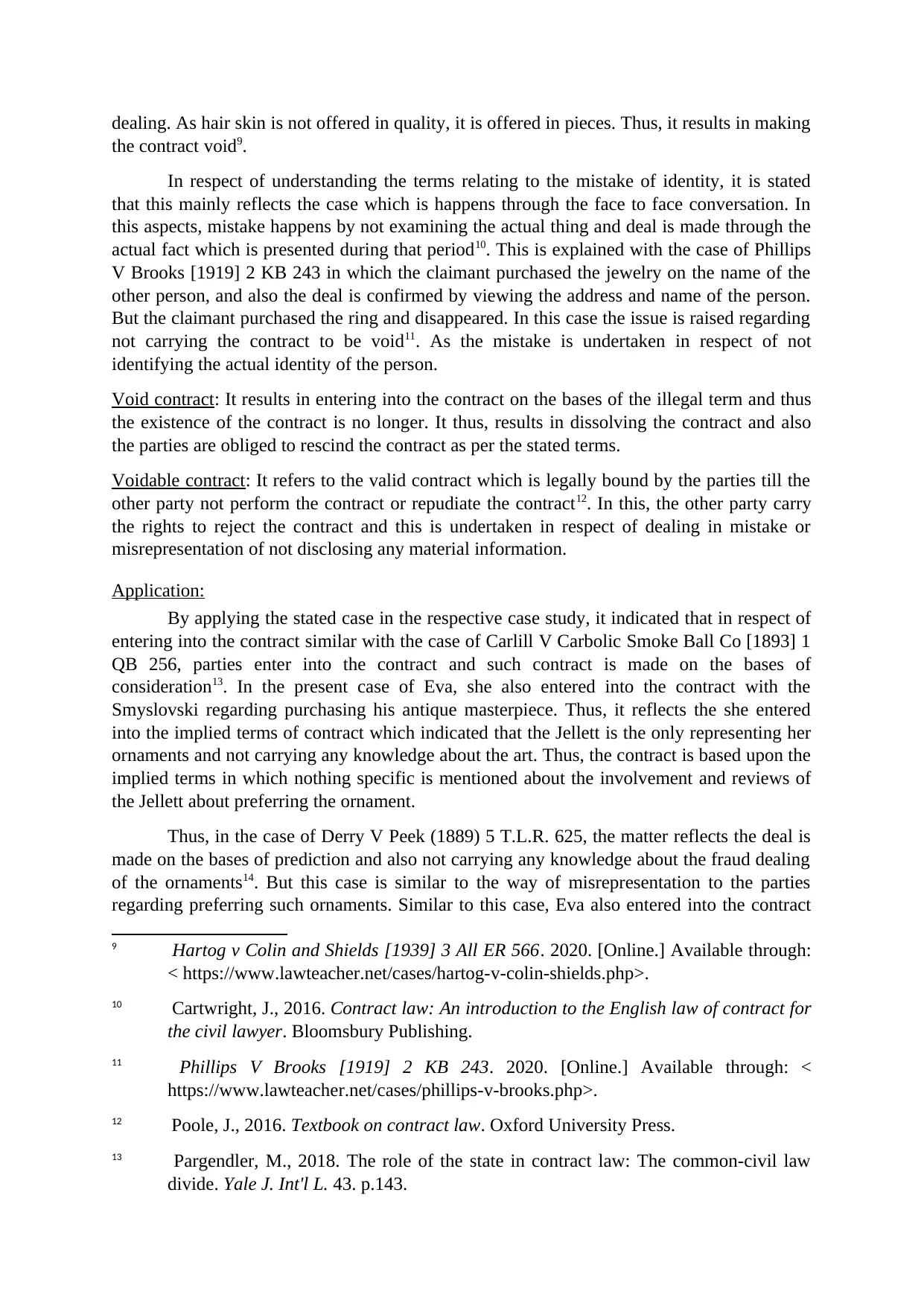
dealing. As hair skin is not offered in quality, it is offered in pieces. Thus, it results in making
the contract void9.
In respect of understanding the terms relating to the mistake of identity, it is stated
that this mainly reflects the case which is happens through the face to face conversation. In
this aspects, mistake happens by not examining the actual thing and deal is made through the
actual fact which is presented during that period10. This is explained with the case of Phillips
V Brooks [1919] 2 KB 243 in which the claimant purchased the jewelry on the name of the
other person, and also the deal is confirmed by viewing the address and name of the person.
But the claimant purchased the ring and disappeared. In this case the issue is raised regarding
not carrying the contract to be void11. As the mistake is undertaken in respect of not
identifying the actual identity of the person.
Void contract: It results in entering into the contract on the bases of the illegal term and thus
the existence of the contract is no longer. It thus, results in dissolving the contract and also
the parties are obliged to rescind the contract as per the stated terms.
Voidable contract: It refers to the valid contract which is legally bound by the parties till the
other party not perform the contract or repudiate the contract12. In this, the other party carry
the rights to reject the contract and this is undertaken in respect of dealing in mistake or
misrepresentation of not disclosing any material information.
Application:
By applying the stated case in the respective case study, it indicated that in respect of
entering into the contract similar with the case of Carlill V Carbolic Smoke Ball Co [1893] 1
QB 256, parties enter into the contract and such contract is made on the bases of
consideration13. In the present case of Eva, she also entered into the contract with the
Smyslovski regarding purchasing his antique masterpiece. Thus, it reflects the she entered
into the implied terms of contract which indicated that the Jellett is the only representing her
ornaments and not carrying any knowledge about the art. Thus, the contract is based upon the
implied terms in which nothing specific is mentioned about the involvement and reviews of
the Jellett about preferring the ornament.
Thus, in the case of Derry V Peek (1889) 5 T.L.R. 625, the matter reflects the deal is
made on the bases of prediction and also not carrying any knowledge about the fraud dealing
of the ornaments14. But this case is similar to the way of misrepresentation to the parties
regarding preferring such ornaments. Similar to this case, Eva also entered into the contract
9 Hartog v Colin and Shields [1939] 3 All ER 566. 2020. [Online.] Available through:
< https://www.lawteacher.net/cases/hartog-v-colin-shields.php>.
10 Cartwright, J., 2016. Contract law: An introduction to the English law of contract for
the civil lawyer. Bloomsbury Publishing.
11 Phillips V Brooks [1919] 2 KB 243. 2020. [Online.] Available through: <
https://www.lawteacher.net/cases/phillips-v-brooks.php>.
12 Poole, J., 2016. Textbook on contract law. Oxford University Press.
13 Pargendler, M., 2018. The role of the state in contract law: The common-civil law
divide. Yale J. Int'l L. 43. p.143.
the contract void9.
In respect of understanding the terms relating to the mistake of identity, it is stated
that this mainly reflects the case which is happens through the face to face conversation. In
this aspects, mistake happens by not examining the actual thing and deal is made through the
actual fact which is presented during that period10. This is explained with the case of Phillips
V Brooks [1919] 2 KB 243 in which the claimant purchased the jewelry on the name of the
other person, and also the deal is confirmed by viewing the address and name of the person.
But the claimant purchased the ring and disappeared. In this case the issue is raised regarding
not carrying the contract to be void11. As the mistake is undertaken in respect of not
identifying the actual identity of the person.
Void contract: It results in entering into the contract on the bases of the illegal term and thus
the existence of the contract is no longer. It thus, results in dissolving the contract and also
the parties are obliged to rescind the contract as per the stated terms.
Voidable contract: It refers to the valid contract which is legally bound by the parties till the
other party not perform the contract or repudiate the contract12. In this, the other party carry
the rights to reject the contract and this is undertaken in respect of dealing in mistake or
misrepresentation of not disclosing any material information.
Application:
By applying the stated case in the respective case study, it indicated that in respect of
entering into the contract similar with the case of Carlill V Carbolic Smoke Ball Co [1893] 1
QB 256, parties enter into the contract and such contract is made on the bases of
consideration13. In the present case of Eva, she also entered into the contract with the
Smyslovski regarding purchasing his antique masterpiece. Thus, it reflects the she entered
into the implied terms of contract which indicated that the Jellett is the only representing her
ornaments and not carrying any knowledge about the art. Thus, the contract is based upon the
implied terms in which nothing specific is mentioned about the involvement and reviews of
the Jellett about preferring the ornament.
Thus, in the case of Derry V Peek (1889) 5 T.L.R. 625, the matter reflects the deal is
made on the bases of prediction and also not carrying any knowledge about the fraud dealing
of the ornaments14. But this case is similar to the way of misrepresentation to the parties
regarding preferring such ornaments. Similar to this case, Eva also entered into the contract
9 Hartog v Colin and Shields [1939] 3 All ER 566. 2020. [Online.] Available through:
< https://www.lawteacher.net/cases/hartog-v-colin-shields.php>.
10 Cartwright, J., 2016. Contract law: An introduction to the English law of contract for
the civil lawyer. Bloomsbury Publishing.
11 Phillips V Brooks [1919] 2 KB 243. 2020. [Online.] Available through: <
https://www.lawteacher.net/cases/phillips-v-brooks.php>.
12 Poole, J., 2016. Textbook on contract law. Oxford University Press.
13 Pargendler, M., 2018. The role of the state in contract law: The common-civil law
divide. Yale J. Int'l L. 43. p.143.
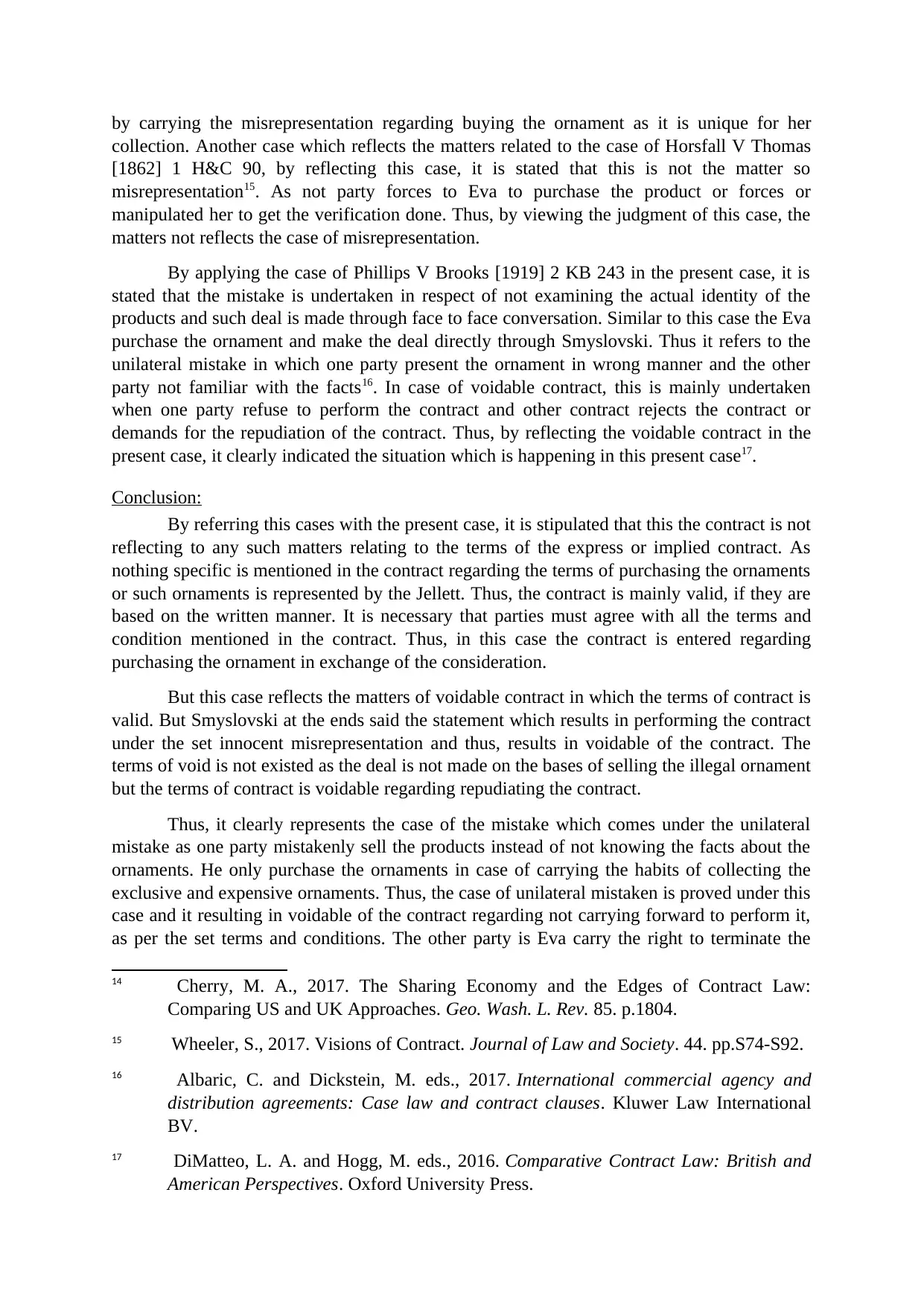
by carrying the misrepresentation regarding buying the ornament as it is unique for her
collection. Another case which reflects the matters related to the case of Horsfall V Thomas
[1862] 1 H&C 90, by reflecting this case, it is stated that this is not the matter so
misrepresentation15. As not party forces to Eva to purchase the product or forces or
manipulated her to get the verification done. Thus, by viewing the judgment of this case, the
matters not reflects the case of misrepresentation.
By applying the case of Phillips V Brooks [1919] 2 KB 243 in the present case, it is
stated that the mistake is undertaken in respect of not examining the actual identity of the
products and such deal is made through face to face conversation. Similar to this case the Eva
purchase the ornament and make the deal directly through Smyslovski. Thus it refers to the
unilateral mistake in which one party present the ornament in wrong manner and the other
party not familiar with the facts16. In case of voidable contract, this is mainly undertaken
when one party refuse to perform the contract and other contract rejects the contract or
demands for the repudiation of the contract. Thus, by reflecting the voidable contract in the
present case, it clearly indicated the situation which is happening in this present case17.
Conclusion:
By referring this cases with the present case, it is stipulated that this the contract is not
reflecting to any such matters relating to the terms of the express or implied contract. As
nothing specific is mentioned in the contract regarding the terms of purchasing the ornaments
or such ornaments is represented by the Jellett. Thus, the contract is mainly valid, if they are
based on the written manner. It is necessary that parties must agree with all the terms and
condition mentioned in the contract. Thus, in this case the contract is entered regarding
purchasing the ornament in exchange of the consideration.
But this case reflects the matters of voidable contract in which the terms of contract is
valid. But Smyslovski at the ends said the statement which results in performing the contract
under the set innocent misrepresentation and thus, results in voidable of the contract. The
terms of void is not existed as the deal is not made on the bases of selling the illegal ornament
but the terms of contract is voidable regarding repudiating the contract.
Thus, it clearly represents the case of the mistake which comes under the unilateral
mistake as one party mistakenly sell the products instead of not knowing the facts about the
ornaments. He only purchase the ornaments in case of carrying the habits of collecting the
exclusive and expensive ornaments. Thus, the case of unilateral mistaken is proved under this
case and it resulting in voidable of the contract regarding not carrying forward to perform it,
as per the set terms and conditions. The other party is Eva carry the right to terminate the
14 Cherry, M. A., 2017. The Sharing Economy and the Edges of Contract Law:
Comparing US and UK Approaches. Geo. Wash. L. Rev. 85. p.1804.
15 Wheeler, S., 2017. Visions of Contract. Journal of Law and Society. 44. pp.S74-S92.
16 Albaric, C. and Dickstein, M. eds., 2017. International commercial agency and
distribution agreements: Case law and contract clauses. Kluwer Law International
BV.
17 DiMatteo, L. A. and Hogg, M. eds., 2016. Comparative Contract Law: British and
American Perspectives. Oxford University Press.
collection. Another case which reflects the matters related to the case of Horsfall V Thomas
[1862] 1 H&C 90, by reflecting this case, it is stated that this is not the matter so
misrepresentation15. As not party forces to Eva to purchase the product or forces or
manipulated her to get the verification done. Thus, by viewing the judgment of this case, the
matters not reflects the case of misrepresentation.
By applying the case of Phillips V Brooks [1919] 2 KB 243 in the present case, it is
stated that the mistake is undertaken in respect of not examining the actual identity of the
products and such deal is made through face to face conversation. Similar to this case the Eva
purchase the ornament and make the deal directly through Smyslovski. Thus it refers to the
unilateral mistake in which one party present the ornament in wrong manner and the other
party not familiar with the facts16. In case of voidable contract, this is mainly undertaken
when one party refuse to perform the contract and other contract rejects the contract or
demands for the repudiation of the contract. Thus, by reflecting the voidable contract in the
present case, it clearly indicated the situation which is happening in this present case17.
Conclusion:
By referring this cases with the present case, it is stipulated that this the contract is not
reflecting to any such matters relating to the terms of the express or implied contract. As
nothing specific is mentioned in the contract regarding the terms of purchasing the ornaments
or such ornaments is represented by the Jellett. Thus, the contract is mainly valid, if they are
based on the written manner. It is necessary that parties must agree with all the terms and
condition mentioned in the contract. Thus, in this case the contract is entered regarding
purchasing the ornament in exchange of the consideration.
But this case reflects the matters of voidable contract in which the terms of contract is
valid. But Smyslovski at the ends said the statement which results in performing the contract
under the set innocent misrepresentation and thus, results in voidable of the contract. The
terms of void is not existed as the deal is not made on the bases of selling the illegal ornament
but the terms of contract is voidable regarding repudiating the contract.
Thus, it clearly represents the case of the mistake which comes under the unilateral
mistake as one party mistakenly sell the products instead of not knowing the facts about the
ornaments. He only purchase the ornaments in case of carrying the habits of collecting the
exclusive and expensive ornaments. Thus, the case of unilateral mistaken is proved under this
case and it resulting in voidable of the contract regarding not carrying forward to perform it,
as per the set terms and conditions. The other party is Eva carry the right to terminate the
14 Cherry, M. A., 2017. The Sharing Economy and the Edges of Contract Law:
Comparing US and UK Approaches. Geo. Wash. L. Rev. 85. p.1804.
15 Wheeler, S., 2017. Visions of Contract. Journal of Law and Society. 44. pp.S74-S92.
16 Albaric, C. and Dickstein, M. eds., 2017. International commercial agency and
distribution agreements: Case law and contract clauses. Kluwer Law International
BV.
17 DiMatteo, L. A. and Hogg, M. eds., 2016. Comparative Contract Law: British and
American Perspectives. Oxford University Press.
⊘ This is a preview!⊘
Do you want full access?
Subscribe today to unlock all pages.

Trusted by 1+ million students worldwide
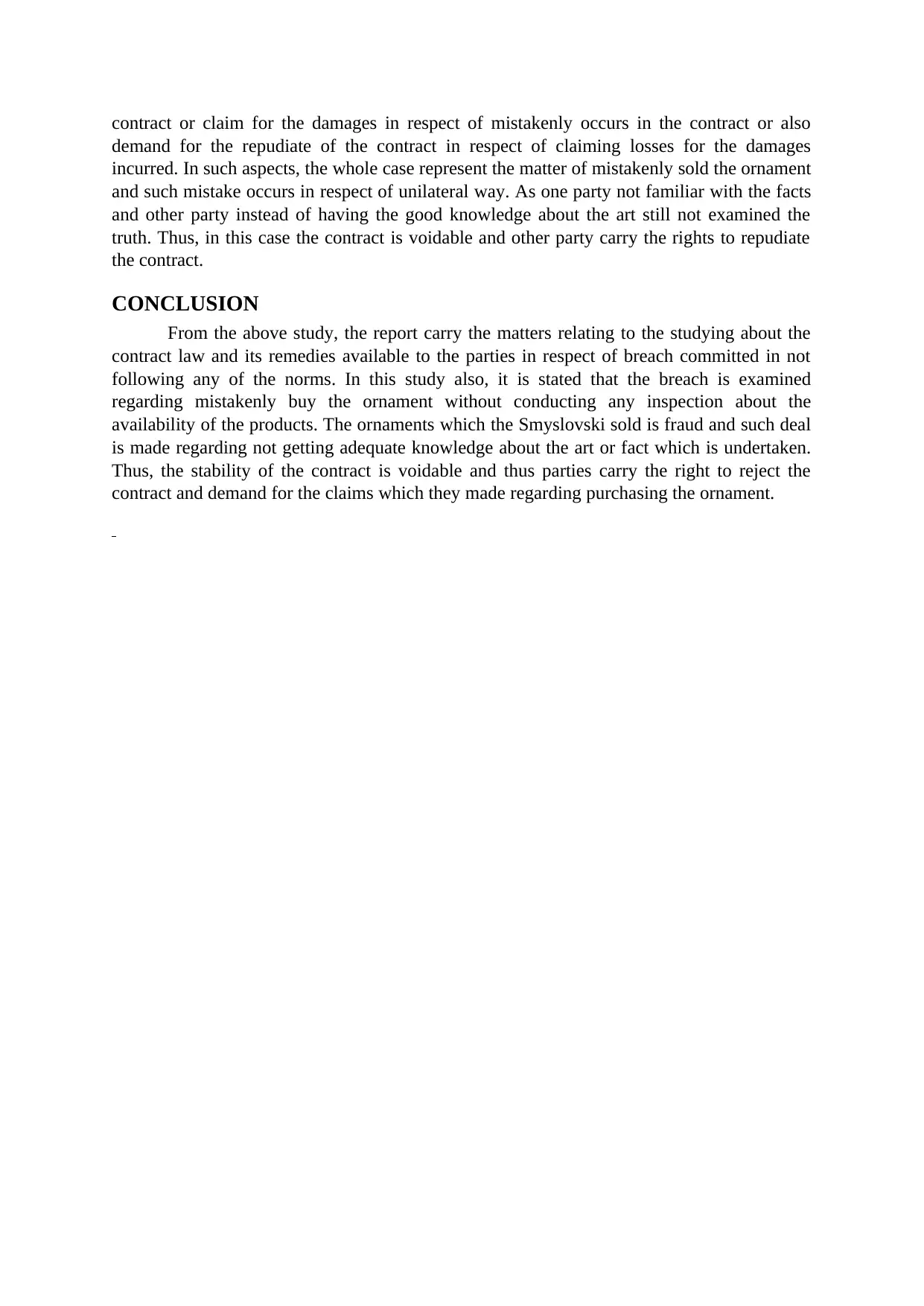
contract or claim for the damages in respect of mistakenly occurs in the contract or also
demand for the repudiate of the contract in respect of claiming losses for the damages
incurred. In such aspects, the whole case represent the matter of mistakenly sold the ornament
and such mistake occurs in respect of unilateral way. As one party not familiar with the facts
and other party instead of having the good knowledge about the art still not examined the
truth. Thus, in this case the contract is voidable and other party carry the rights to repudiate
the contract.
CONCLUSION
From the above study, the report carry the matters relating to the studying about the
contract law and its remedies available to the parties in respect of breach committed in not
following any of the norms. In this study also, it is stated that the breach is examined
regarding mistakenly buy the ornament without conducting any inspection about the
availability of the products. The ornaments which the Smyslovski sold is fraud and such deal
is made regarding not getting adequate knowledge about the art or fact which is undertaken.
Thus, the stability of the contract is voidable and thus parties carry the right to reject the
contract and demand for the claims which they made regarding purchasing the ornament.
demand for the repudiate of the contract in respect of claiming losses for the damages
incurred. In such aspects, the whole case represent the matter of mistakenly sold the ornament
and such mistake occurs in respect of unilateral way. As one party not familiar with the facts
and other party instead of having the good knowledge about the art still not examined the
truth. Thus, in this case the contract is voidable and other party carry the rights to repudiate
the contract.
CONCLUSION
From the above study, the report carry the matters relating to the studying about the
contract law and its remedies available to the parties in respect of breach committed in not
following any of the norms. In this study also, it is stated that the breach is examined
regarding mistakenly buy the ornament without conducting any inspection about the
availability of the products. The ornaments which the Smyslovski sold is fraud and such deal
is made regarding not getting adequate knowledge about the art or fact which is undertaken.
Thus, the stability of the contract is voidable and thus parties carry the right to reject the
contract and demand for the claims which they made regarding purchasing the ornament.
1 out of 7
Related Documents
Your All-in-One AI-Powered Toolkit for Academic Success.
+13062052269
info@desklib.com
Available 24*7 on WhatsApp / Email
![[object Object]](/_next/static/media/star-bottom.7253800d.svg)
Unlock your academic potential
Copyright © 2020–2026 A2Z Services. All Rights Reserved. Developed and managed by ZUCOL.





